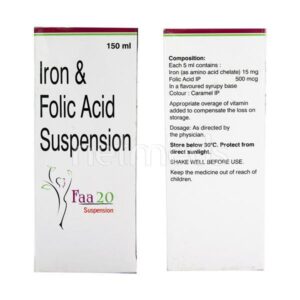IRON + VITAMINS + FOLICA AICD
Iron: Iron is a mineral supplement used to treat or prevent iron deficiency anemia. It is an essential mineral that is necessary for the production of red blood cells and the transportation of oxygen throughout the body.
The mechanism of action of iron involves its role in the formation of hemoglobin, a protein present in red blood cells that binds to oxygen and carries it to the body’s tissues. Iron is crucial for the synthesis of hemoglobin, and without sufficient levels of iron, there is a decrease in the production of red blood cells, leading to anemia.
Iron is available in various forms, including tablets, capsules, and liquid preparations. The dosage of iron may vary depending on the severity of the deficiency and the individual’s age and overall health. Typically, the recommended dose for adults is 325 mg of ferrous sulfate orally three times a day. It is essential to follow the prescribed dosage and duration as directed by a healthcare professional.
Like any medication, iron can cause side effects. Common side effects include constipation, nausea, stomach cramps, diarrhea, and darkening of the stool. Some individuals may experience an allergic reaction to iron, characterized by rash, itching, swelling, severe dizziness, or trouble breathing. In rare cases, iron supplements can lead to iron overload, especially in individuals with certain conditions such as hemochromatosis or repeated blood transfusions. Iron overload can have serious health consequences and may require medical intervention.
It is important to note that iron supplements should be taken under the guidance of a healthcare professional. They may interact with certain medications, decrease the absorption of other minerals like zinc or calcium, and should be avoided in certain conditions like hemosiderosis or thalassemia.
Overall, iron is a vital mineral supplement used to treat or prevent iron deficiency anemia. It works by replenishing the body’s iron stores and promoting red blood cell production. However, it is important to use iron supplements correctly and be aware of potential side effects or interactions with other medications.
Vitamins: Drug: Vitamins
Use: Vitamins are essential organic compounds that are necessary for normal metabolic functions in the body. They are needed in small quantities and are crucial for maintaining good health. Vitamins are commonly used as supplements to maintain optimal levels of nutrients in the body, especially when a person’s diet may be lacking in certain vitamins.
Mechanism of Action: Vitamins function as coenzymes or cofactors, which are necessary for the proper functioning of enzymes in various metabolic pathways. They help in the conversion of food into energy, maintenance of healthy skin, production of red blood cells, and support the immune system and overall well-being.
Dose: The recommended dosage of vitamins varies depending on the specific vitamin, age, gender, and individual needs. Each vitamin has its own recommended daily allowance (RDA) or adequate intake (AI) set by health authorities. It’s important to follow the dosage instructions provided on the label of the specific vitamin supplement or consult a healthcare professional for guidance.
Side Effects: Vitamins are generally considered safe when taken within the recommended dosage. However, excessive intake of certain vitamins can lead to toxicity and adverse effects. For instance, excessive intake of fat-soluble vitamins like vitamin A, D, E, and K can accumulate in the body and cause toxicity symptoms such as nausea, vomiting, headache, dizziness, and even organ damage. Water-soluble vitamins like vitamin C and B-complex are generally less likely to cause toxicity since excess amounts are excreted through urine. However, high doses of vitamin C may cause diarrhea, stomach cramps, or kidney stones in some individuals.
It’s important to note that while vitamin supplements can be beneficial for individuals with deficiencies or specific medical conditions, a balanced diet rich in fruits, vegetables, whole grains, and lean proteins should be the primary source of vitamins. As with any supplement or medication, it is advisable to consult a healthcare professional before starting a new vitamin regimen to determine the appropriate dosage and assess any potential interactions with other medications or health conditions.
Folica Aicd: I’m sorry, but I couldn’t find any information on a drug called “Folica Aicd.” It’s possible that there may be a misspelling or a lack of available details. Can you please confirm the name of the drug or provide more information?

